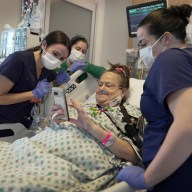 Chishu Ryu and tk play neglected parents visiting their grown kids in Yasujiro Ozu’s “Tokyo Story.”
Chishu Ryu and tk play neglected parents visiting their grown kids in Yasujiro Ozu’s “Tokyo Story.”
Credit: The Criterion Collection
‘Tokyo Story’
The Criterion Collection
$39.95
Last year, “Vertigo” famously usurped “Citizen Kane”’s place atop Sight and Sound’s “greatest films” poll. Less reported was that “Tokyo Story” — Yasujiro Ozu’s serenely devastating portrait of family dysfunction — took bronze, as it did when it entered the poll back in 1992. (It “only” scored fifth in 2002.) Third place of all time is nothing to sneeze at, and though there are better Ozus — “Late Spring” and “The Munekata Sisters” come to mind — few are as direct and (that horrid word) “accessible” to mainstream audiences.
Indeed, “Tokyo Story,” from 1953, preys on a primal worry few films dare touch: what to do with parents once they get up in age. Ozu regular Chishu Ryu and Chieko Higashiyama play 60-something retirees who head for bustling Tokyo, where dwell three of their five children. It’s presumed because their kids live in the big town that they’ve “made it.” In fact, all three are less well-off than it’s presumed. That doesn’t make them any less busy (or, in some cases, indifferent). The parents — eternally smiling and unfailingly polite — spend most of their time with lonely (but also ever-smiling) Noriko (Setsuko Hara), the widow of their second son.
Because Ozu’s style is unhurried and contemplative — the camera always lets people speak in full (with space before and after) — one can easily assume he’s on the side of the aging, who are ignored by their callous spawn. (This is what happens in an even sadder film, 1937’s “Make Way For Tomorrow,” which tore apart a penniless geriatric couple right as the creation of social security was being debated.) But it’s a deeper and more understanding film than that, one that offers the notion that kids growing apart from their parents, while terrible, is a fact of life.
“Isn’t life disappointing,” the youngest daughter — the only one still living with the folks — remarks, perhaps not fully realizing that she too will one day have her own life and problems that prove to be permanent distractions. Resentments exist on both ends: The adult kids don’t have the patience for their decaying parents, while the parents, in private, can’t help feel disappointment that their kids didn’t amount to even more. Our leads themselves were once very different, it’s revealed in stray bits of dialogue: dad a drunk, mom vivacious, neither of which they are now.At the same time no one can stay bitter. There’s volcanic neuroses under the calm surface, but one reason they rarely bubble over is because the characters understand that life goes on regardless, especially as they get older. Age brings first wisdom then wisdom crossed with exhaustion.
‘The World’s End’
$34.98
Despite amusingly similar titles and premises, not enough American ticketbuyers mistakenly queued up for the third in Edgar Wright, Simon Pegg and Nick Frost’s so-called “Cornetto trilogy,” thinking they were getting the Apatow-fest “This is the End.” Too bad, as this is even sillier and more inspired. A reunion by way of an impossible pub crawl gets interrupted by a unique interpretation of the (or at least an) apocalypse, and like “Shaun of the Dead” and “Hot Fuzz” before it, it’s bound to be a permanent fixture inside Blu-ray/DVD players.
Also out:
‘2 Guns’
One wouldn’t immediately think to pair Denzel with Marky Mark, but this ’70s throwback caper is surprisingly good, loopy fun.
‘The Crystal Fairy’
Michael Cera has been trying to throw off the shackles of being George Michael Bluth, and his latest gambit is to be a jerk tripping on mescaline in Argentina. It works!
‘Violet & Daisy’
This dark comedy has Saoirse Ronan and Alexis Bledel as emotionally stunted assassins, but the actual draw is James Gandolfini as their melancholic mark.
















